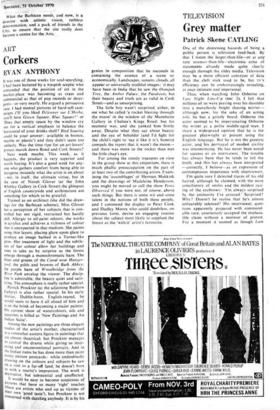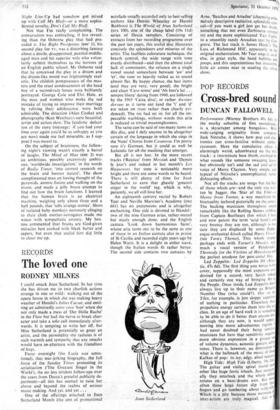TELEVISION
Grey matter
Patrick Skene CATLING
One of the distressing hazards of being a public person is television feed-back. By
that I mean the larger-than-life--or at any rate inrenser-than-life—electronic echo of statements already made quite clearly enough through the older media. Television may be a more efficient conveyor of data than the cleft stick used to be, but TV'S efficiency can be embarrassingly revealing, at once intimate and impersonal.
Thus, when watching John Osborne on Late Night Line-Up Ow 2), I felt that millions of us were peering over his shoulder into a mercilessly bright shaving mirror— although now, for the sake of an acting role, he has a grizzly beard. Osborne the actor seemed to be impersonating Osborne the writer as a polite middle-aged man. I share a widespread opinion that he is the greatest playwright at present using the English language. But he is not the greatest actor, and his portrayal of modest civility was unconvincing. He has never been noted for success as an interviewee. The trouble has always been that he tends to tell the truth; and this has always been interpreted —correctly, I believe—as an expression of contemptuous impatience with interviewers.
I'm quite sure I detected traces of his old hatred, although he claimed, with the most conciliatory of smiles and the mildest rais- ing of the eyebrows: 'I'm always surprised by the animosity I've aroused.' Surprised? Why? Doesn't he realise that he's almost unbearably- talented? His interviewer, ques- tions apparently prepared with commend- able care, courteously accepted the implaus- ible claim without a murmur of protest. For a moment it seemed as though Late
Night Line-Up had somehow got mixed up with Call My Bluff—or a more sophis- ticated novelty, Don't Call My Bluff.
Not that I'm really complaining. The conversation was enthralling, if less reveal, ing than the Osborne play that had pre- ceded it. The Right Prospectus Om 1), his second play for TV, was a disturbing fantasy about a docile, disappointed, puzzled middle- aged man and his superior wife who volun- tarily submit themselves to the horrors of an English public school. Mr Osborne said that he conceived the play in a dream and the dream-like mood was frighteningly real- istic. The childish pompousness of the mas- ters and the cruel condescension of the head boy of a second-rate house were brjlliantly- portrayed. George Cole and Elvi Hale, as the man and woman who make the sad mistake of trying to improve their marriage by reliving their adolescence, were both admirable. The direction (Alan Cooke) and photography (Ken Westbury) were beautiful, script and action slow. The fatalistic defeat- ism of the story (message: if you had your time over again you'd be as unhappy as you are now) made me feel miserable, as I sup- pose I was meant to.
On the subject of braininess, the follow- ing night's viewing wasn't exactly a barrel of laughs. The Mind of Man (Buc 2) was an- ambitious, possibly excessively ambiti- ous, 'worldwide investigation,' in the words of Radio Times, 'into current research on the brain and human nature'. The show complimented man on having thought of the pyramids, atomic fission and walking on the moon, and made a jolly brave attempt to find out how the brain functions. I learned that the human brain is an electrical machine, weighing only about three and a half pounds, that 'tells strange stories'. Shots of isolated baby monkeys nervously clinging to their cloth mother-surrogates made me wince with sympathetic anxiety. My hos- tess commented that brains are God-given miracles best cooked with black butter and capers, but even that useful hint did little to cheer me up.











































 Previous page
Previous page